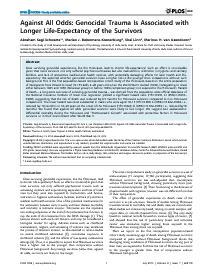Against All Odds : Genocidal Trauma Is Associated with Longer Life-Expectancy of the Survivors
Does surviving genocidal experiences, like the Holocaust, lead to shorter life-expectancy? Such an effect is conceivable given that most survivors not only suffered psychosocial trauma but also malnutrition, restriction in hygienic and sanitary facilities, and lack of preventive medical and health services, with potentially damaging effects for later health and life-expectancy. We explored whether genocidal survivors have a higher risk to die younger than comparisons without such background. This is the first population-based retrospective cohort study of the Holocaust, based on the entire population of immigrants from Poland to Israel (N = 55,220), 4–20 years old when the World War II started (1939), immigrating to Israel either between 1945 and 1950 (Holocaust group) or before 1939 (comparison group; not exposed to the Holocaust). Hazard of death – a long-term outcome of surviving genocidal trauma – was derived from the population-wide official data base of the National Insurance Institute of Israel. Cox regression yielded a significant hazard ratio (HR = 0.935, CI (95%) = 0.910–0.960), suggesting that the risk of death was reduced by 6.5 months for Holocaust survivors compared to non-Holocaust comparisons. The lower hazard was most substantial in males who were aged 10–15 (HR = 0.900, CI (95%) = 0.842–0.962, i.e., reduced by 10 months) or 16–20 years at the onset of the Holocaust (HR = 0.820, CI (95%) = 0.782–0.859, i.e., reduced by18 months). We found that against all odds genocidal survivors were likely to live longer. We suggest two explanations: Differential mortality during the Holocaust and “Posttraumatic Growth” associated with protective factors in Holocaust survivors or in their environment after World War II.
Geachte bezoeker,
De informatie die u nu opvraagt, kan door psychotraumanet niet aan u worden getoond. Dit kan verschillende redenen hebben,
waarvan (bescherming van het) auteursrecht de meeste voorkomende is. Wanneer het mogelijk is om u door te verwijzen naar de bron
van deze informatie, dan ziet u hier onder een link naar die plek.
Als er geen link staat, kunt u contact opnemen met de bibliotheek,
die u verder op weg kan helpen.
Met vriendelijke groet,
Het psychotraumanet-team.
In: Plos One ISSN: 1932-6203 | 8 | 7 | e69179
https://journals.plos.org/plosone/article


